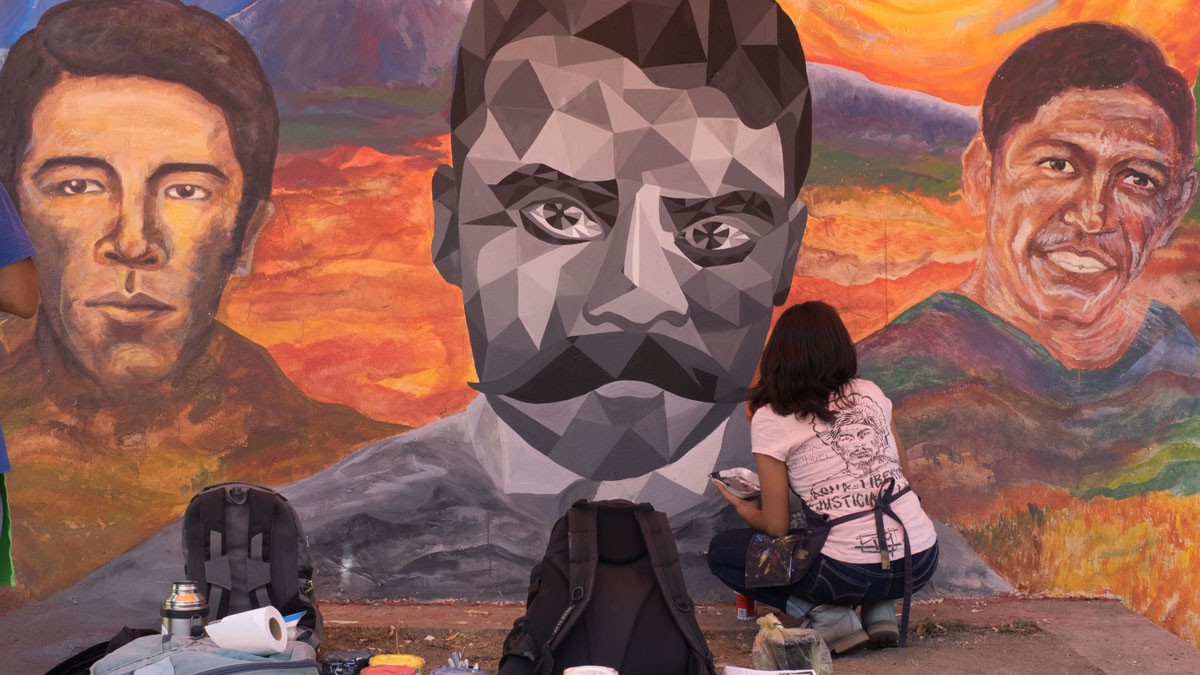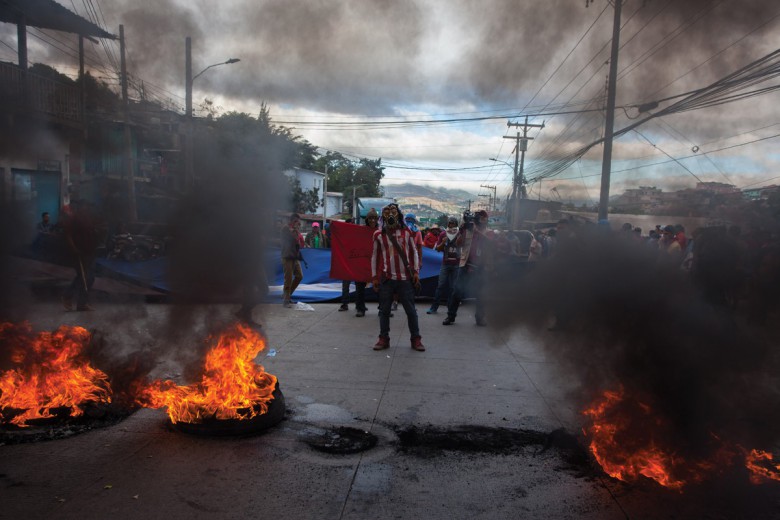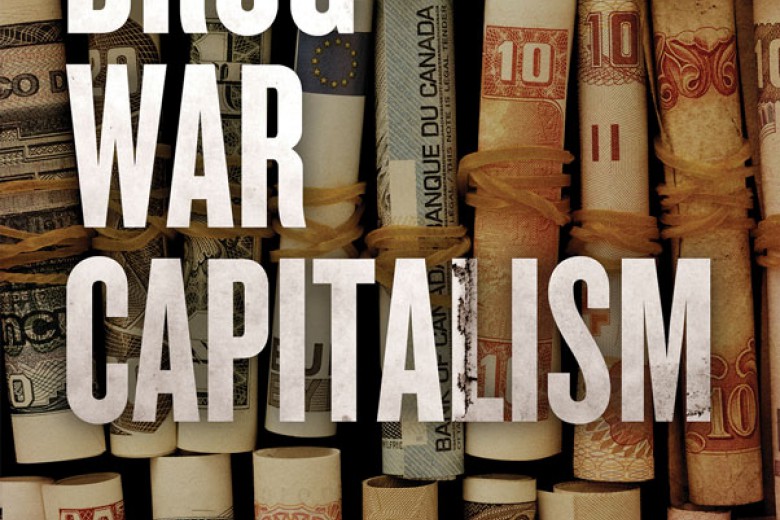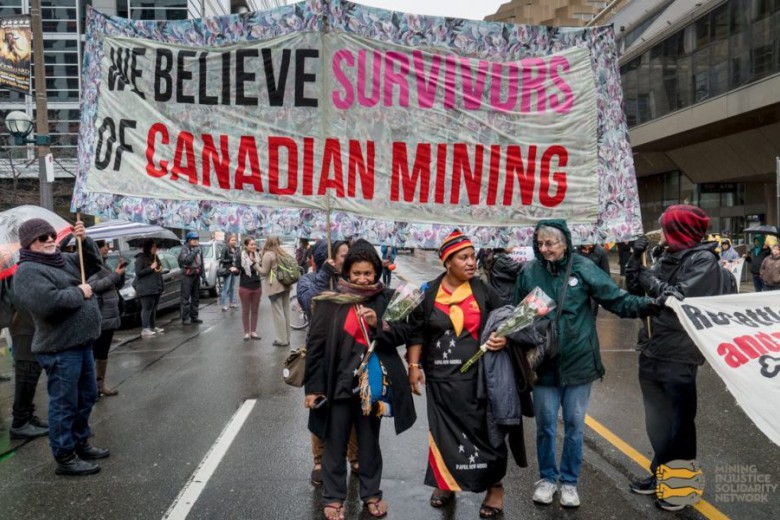Samir Flores Soberanes was a teacher, a campesino, a community organizer, a radio host, and an Indigenous Nahua land and water defender. In February, Samir was killed in his home, shot twice in the head.
Samir was a prominent voice within the Frente de Pueblos en Defensa de la Tierra y el Agua (People’s Front in Defence of the Land and Water), an organization fighting to stop the Proyecto Integral Morelos (PIM), which would see the operation of two thermoelectric plants and a natural gas pipeline in the shadow of the very active Popocatépetl volcano in central Mexico. Land defenders are fiercely opposed to the project – they believe it will divert water supplies in the region away from agricultural use and ultimately will undermine the way of life of the Nahua people in the state of Morelos.
Local officials told Mexican media that his murder was tied to organized crime, a frequent explanation proffered by officials whenever an activist or journalist is killed in Mexico, a country racked by cartel-related violence. But the timing of his murder – mere days before a contentious plebiscite, which would determine the future of the PIM, was set to be held – left little doubt in the minds of his comrades: Samir was killed in order to try to debilitate the work of those opposing the PIM and send a message that the project would proceed.
“He was a very creative person, multifaceted. His absence leaves a void in community work, in the work with the population,” Juan Carlos Flores, a member of the People’s Front in Defence of the Land and Water, tells Briarpatch.
“They have no idea who they took from us,” says Hugo Franco Guzman, one of the hosts at the local radio station that Samir helped to start.
Samir was a man of diminutive size but with a booming voice. His colleagues at the radio station say that people were often incredulous when they met him in person, unable to believe that a voice so big could come out of a person so small. He had a way with words, and as a result he was often thrust into the spotlight.
But the timing of his murder left little doubt in the minds of his comrades: Samir was killed in order to try to debilitate the work of those opposing the PIM and send a message that the project would proceed.
Samir knew he had a target on his back. His comrades say that he often talked about the need for others to fill his shoes once he was gone.
After his death, Guzman says that for two weeks the station was quiet – few volunteers showed up to conduct their shows. But they knew that they could not allow their mourning to affect the work.
“He would not have wanted this project to die,” says Guzman.
So instead of sinking, they sought to bring in more people, to make the station grow.
Today, walking through his hometown of Amilcingo, you can see Samir’s face everywhere. Posters and paintings of him adorn building walls, and the school at which he taught has been renamed by local activists in his honour.
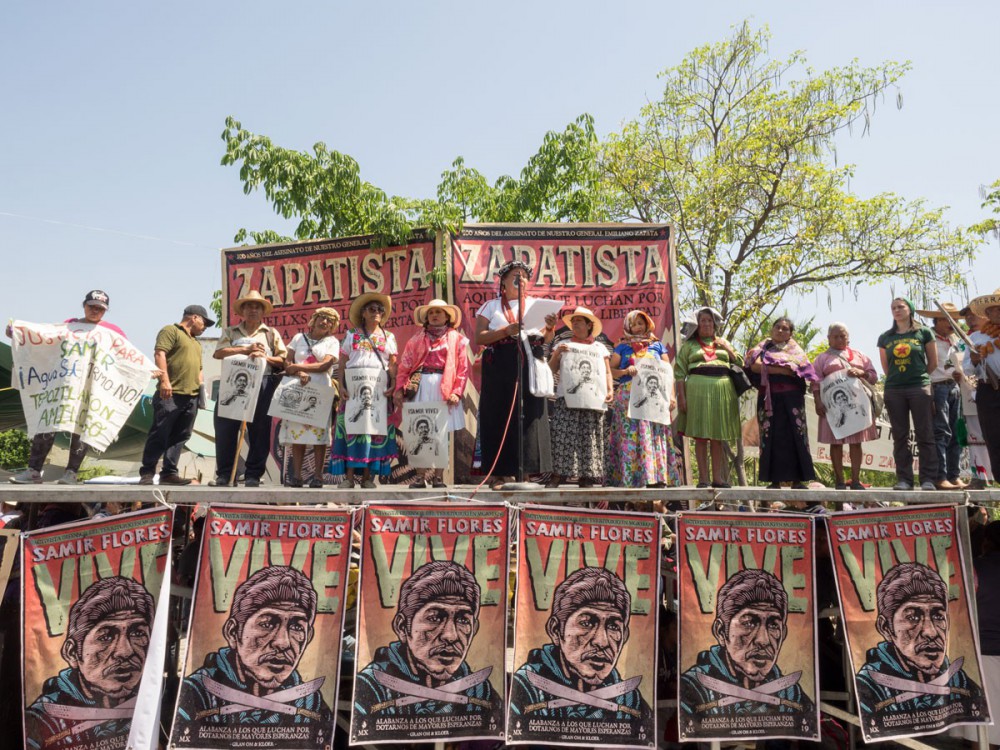
Likewise, his comrades in the People’s Front in Defence of the Land and Water reasoned that the best way to celebrate Samir’s life was by continuing their work.
“We feel anger, outrage that a person with so many values, with such capacity, a good human being in every sense of the word, was murdered by shady interests,” says Flores. “We are going to struggle because our comrade gave his life so that this could continue.”
Neoliberalism and extractive industries
Despite protests and appeals to the federal government to suspend the plebiscite on the PIM in light of Samir’s murder, the government of Mexican president Andrés Manuel López Obrador (AMLO, as he is widely known) proceeded with the vote. However, in Amilcingo, demonstrators refused to let the vote take place, burning the ballots and ballot boxes.
The People’s Front in Defence of the Land and Water charged that first, it was inappropriate to hold the vote so soon after Samir’s death; second, previous consultations had not sufficiently advised the population about the risks involved with the project; and third, the plebiscite did not meet the standards set out by the International Labour Organization’s Convention 169 concerning the rights of Indigenous peoples to decide what happens in their territory.
Activists were particularly incensed because they knew López Obrador was personally aware of the environmental threat posed by the PIM – he had declared his opposition to the project during a rally in Morelos in 2014.
López Obrador’s intransigence confirmed activists’ worries that, despite being given a strong mandate to dramatically change course for Mexico, when it came to extractive industries, the new government would continue to pursue extractive projects without obtaining free, prior, and informed consent.
Activists were particularly incensed because they knew López Obrador was personally aware of the environmental threat posed by the PIM.
López Obrador won the 2018 election with over 53 per cent of the vote and ample majorities for his party in the country’s Congress. After three decades of neoliberal rule by two parties that oversaw market reforms that increased inequality, poverty, and social exclusion, the country had finally elected a leftist president. Billing his government as the “fourth transformation” of Mexico, AMLO promised to root out corruption, address rising crime and violence, and redistribute wealth to the country’s poor.
In his first 100 days, López Obrador put the $218 million-dollar presidential plane up for sale; officially shuttered the infamous Islas Marías federal prison, with plans to convert it into a cultural centre; dramatically cut his own salary; refused to move into the ostentatious presidential residence; and introduced a series of social programs that included a universal pension for people over 68 years and people with disabilities.
A fierce opponent of the neoliberal economic orthodoxy championed by his predecessors, López Obrador even decreed the end of neoliberalism in Mexico.
In an interview with Briarpatch in late 2018, renowned Marxist geographer David Harvey explains that the political programs of the “pink wave” – which has seen socialist and left-leaning governments elected throughout Latin America over the last few decades – were anti-neoliberal but not anti-capitalist. He views López Obrador’s program in a similar light.
While Harvey welcomed López Obrador’s efforts to confront neoliberalism, he also warned that they would fall short.
“At the end of the day, we have to think about what it means to be anti capital,” says Harvey. “I know the immense power that is wielded by the oligarchs here – Carlos Slim and the like. At some point that needs to be confronted and controlled, because [if you spend] all the time solving little problems and you don’t confront that power, it means that central guiding principles of Mexican political economy are going to be dictated by a small elite class configuration.”
“At the end of the day, we have to think about what it means to be anti capital.”
López Obrador has said that one of the goals of the fourth transformation is to end the subordination of political power to the economic power of Mexican oligarchs. But Harvey thinks the president may have underestimated how difficult that will be to accomplish.
López Obrador’s about-face on the PIM draws into question just how far he can go in this effort. Flores tells Briarpatch that he suspects the president’s support of the PIM is likely due to the investment and tax revenue it will bring to the state, and his coziness with certain elements of Mexico’s ruling class. López Obrador’s chief of staff is a wealthy businessman by the name of Alfonso Romo, who was an ardent supporter of former president Vicente Fox. López Obrador also surprised many when he accepted a proposal by Mexico’s business community to create a presidential business advisory board that includes representatives who have vocally criticized his political proposals.
The Mexican president has been inconsistent in his efforts to root out the influence of the country’s economic elite. In the case of the new mega-airport in Mexico City, which was strongly supported by the country’s business sector, López Obrador opted to cancel its construction, despite the project already being in progress.
Harvey also has a warning for Mexicans about López Obrador’s plans to pursue megaprojects in order to lure foreign investment and generate income in order to fund the government’s social projects.
“Beware of megaprojects. Big capital loves megaprojects; politicians are often drawn to megaprojects because it will bear their name,” Harvey tells Briarpatch.
Megaprojects: opportunity or threat?
AMLO has moved quickly on his campaign proposal to build 1,500 kilometres of train tracks throughout the Yucatan peninsula. Known as the Tren Maya, the project is aimed at boosting tourism in the region but has been challenged by Indigenous groups and environmentalists due to its ecological impact. The train is expected to run through the ecologically sensitive Calakmul Biosphere Reserve that is home to much of Mexico’s rich biodiversity, including at-risk species such as the jaguar, king vulture, and Central American tapir.
Megaprojects like the PIM and the Tren Maya have anti-capitalist groups on alert and dubious about López Obrador’s claims regarding the end of neoliberalism.
“It’s a lie to decree the end of neoliberalism in Mexico; it’s a fallacy,” Flores tells Briarpatch. “To eliminate a system like this, you do not do it with a statement to the media. It is done through concrete acts.”
Many groups expected that López Obrador might pursue a more conciliatory stance toward Indigenous peoples who defend their territories. Previous regimes resorted to violence, criminalization, and repression to suppress social movements, while López Obrador has, so far, shunned these tactics. Flores argues that the López Obrador government nevertheless represents a continuity of neoliberalism, but with a change in strategy.
“It’s a lie to decree the end of neoliberalism in Mexico; it’s a fallacy. To eliminate a system like this, you do not do it with a statement to the media. It is done through concrete acts.”
While López Obrador has repeatedly stated that he will not use state security forces to repress protests, Flores believes his government is still sidelining opposition from groups like People’s Front in Defence of the Land and Water. Flores charges that, by holding the vote without sufficient time to educate the public and placing ballot boxes in communities that were likely to favour the project, the consultations concerning the PIM were “fixed.”
It was those consultations – and the public support they supposedly evidenced – that have allowed López Obrador to claim he is respecting the will of the people.
There are worries among activists that the López Obrador government will attempt to use these types of scuttled “citizen consultations” in place of free, prior, and informed consent as a means of legitimizing megaprojects. However, that scenario is looking increasingly unlikely, as in May a federal court agreed with opponents of the PIM who argued that the plebiscite infringed on their rights as Indigenous peoples to give consent to activities in their territories, a decision that looks to establish a precedent.
The López Obrador government nevertheless claims that they are complying with their obligations. For example, the National Institute of Indigenous Peoples, a government agency, said they received consent from affected Indigenous communities in the isthmus of Tehuantepec for a project that seeks to build a train that will connect the country’s coasts.
This threat of dispossession is at the heart of the conflict between the López Obrador government and land defenders. Flores draws a parallel with Mexican revolutionary Emiliano Zapata Salazar who, 100 years ago, led the campesinos in the state of Morelos to fight against the landowners who exploited land and water for sugar cane production.
“There is still a preference for private capital to dispossess and exploit [the] territory [of Indigenous peoples],” says Flores.
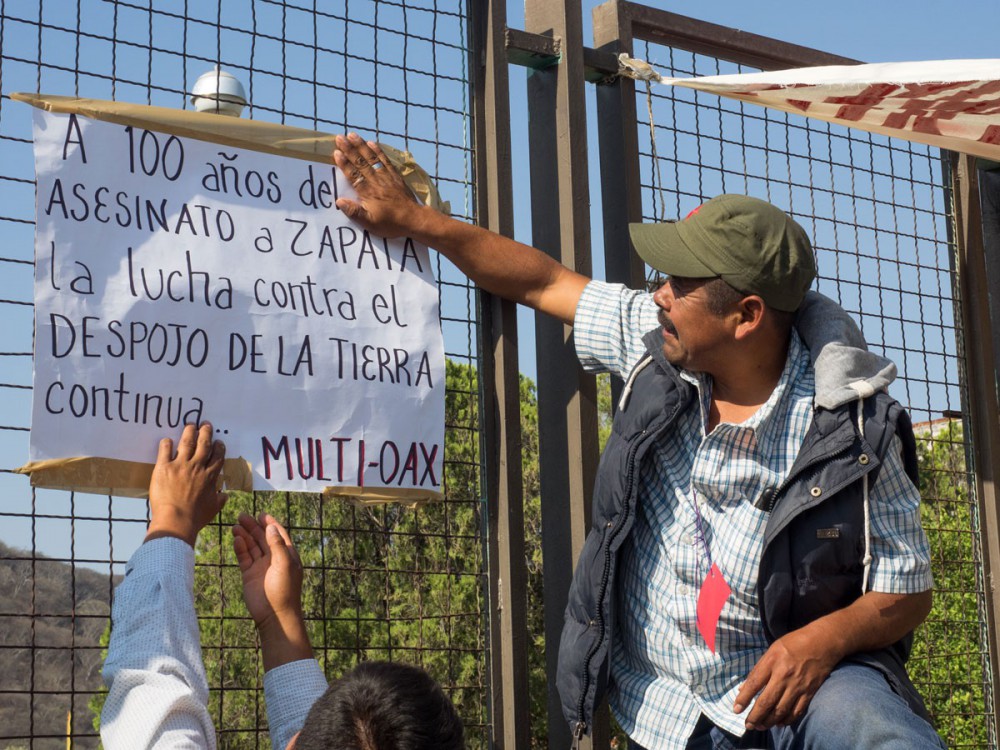
The PIM aims to attract and grow industrial developments in the centre of the country, to create a hub of employment in a region that has seen little economic growth. This same development would also increase government revenues, helping bring in money to finance social programs. It is a strategy seen elsewhere in the region, in countries such as Ecuador and Bolivia, where socialist governments used windfall revenues from resource extraction to address what Latin Americans call “social debt” – the deficiencies caused by previous neoliberal governments’ lack of investment in public services like roads, schools, and hospitals.
Flores concedes that the project will lead to new employment, but he argues that it is a regressive redistribution of wealth, where natural resources that rightfully belong to all are exploited and controlled by private capital.
In effect, it will lead to the proletarianization of campesinos – bringing small-scale farmers who were on the periphery of the market directly into it as wage labourers.
The Canadian connection
The new Mexican ambassador to Canada, Juan José Gómez-Camacho, made headlines when he said in March that Canadian mining companies would face increased scrutiny regarding their practices in Mexico.
Canadian mining companies are heavily invested in Mexico – according to Global Affairs Canada, nearly 70 per centof foreign-owned mining companies operating in Mexico are based in Canada.
But Canadian mining companies have a long and sordid history in Latin America, and in Mexico companies such as Vancouver-based Fortuna Silver Mines have been accused of abuses and illegal behaviour.
Marco Antonio Espinoza of the anti-mining organization Articulación por la Vida y en Contra de la Minería (AVCM) explains that, 10 years ago, a large contingent of state security forces, including armoured vehicles and helicopters, invaded the community of Valle de Ocotlán to crush widespread opposition against a Fortuna mine.
“The company never had free, prior, and informed consent [to operate],” recalls Espinoza.
In effect, it will lead to the proletarianization of campesinos – bringing small-scale farmers who were on the periphery of the market directly into it as wage labourers.
Incidents like that serve to highlight why López Obrador’s ambassador was keen to signal a change. But though Gómez-Camacho issued a warning to Canadian mining companies, he also made clear that the López Obrador government was still interested in courting Canadian mining companies, telling media outlets that Mexico was interested in a “strong, profitable mining sector” that includes Canadian capital.
Kirsten Francescone, Latin American coordinator at MiningWatch Canada, tells Briarpatch that their organization expects little to change under López Obrador.
Francescone says Mexican officials have bought into the myth, promoted by the Canadian state, that there can be sustainable and responsible mining projects that respect human rights. Members of López Obrador’s government and a team of advisers even visited Canada to see examples of “sustainable and responsible mining.”
“MiningWatch Canada has demonstrated time and again that we are in no position to present ourselves as a model in terms of environmental regulations, waste management, community relationships. We have just as many problems here in Canada,” Francescone tells Briarpatch.
Officials from Global Affairs Canada confirmed to MiningWatch that they had received delegations from the new Mexican government and that they felt confident about their relationship with the López Obrador administration and the future of Canadian mining in Mexico.
While it would appear that López Obrador’s government intends to bring improvements in terms of standards and practices, they are not willing to turn their backs to Canadian mining operations in Mexico.
“If anything, what we suspect we’ll see is an […] attempt to accommodate Canadian mining interests in Mexico,” says Francescone.
Resistance moving forward
The positions taken by the López Obrador government have made it evident that this government is not willing to abandon extractive industries. As in other examples throughout Latin America during the “pink wave,” the Mexican government is instead betting on these industries to bring in investment and employment.
This is the fundamental contradiction of all left electoral projects that do not seek to transcend capitalism: they invariably pit themselves against Indigenous peoples and their allies, who stand in the way of what Marxists call the “primitive accumulation of capital” – the theft and commodification of lands and waters.
“López Obrador came to power because there is a lot of social discontent in the country. […] That social discontent cannot be extinguished from one day to the next,” says Flores. “You cannot cover up the contradictions [of capitalism].”
The development strategy being pursued by the López Obrador government is likely to produce further clashes with social movements and land defenders. Groups like the People’s Front in Defence of the Land and Water are unwavering in their intent to resist López Obrador’s megaprojects and right now they stand in firm opposition to the government – but that does not mean the door is closed to all dialogue.
“If anything, what we suspect we’ll see is an […] attempt to accommodate Canadian mining interests in Mexico.”
Flores argues that the first step must be a recognition of the collective and individual rights of communities, principally the right to defend their territories. He says that community members should decide what happens in their land and communities through a transparent and inclusive process.
Similarly, organizers with AVCM are not opposed to change, so long as it respects their way of life.
“We’re not opposed to [projects] that work hand in hand with our culture and that allow us to develop within the confines of our culture,” explains Juan Perez from AVCM. “It’s not an opposition for the sake of opposing – it is instead to defend what our ancestors left us.”
Meanwhile, he also makes an appeal to people in Canada to hold their companies and their governments accountable for their activities abroad.
“That wealth, the comfort they enjoy, the wellness they have, it is at our expense. We suffer dispossession, killings, forced disappearances, hunger, injustice, a whole series of things, so that they can live well,” says Perez. “That comfort you enjoy is temporary. The world is changing and neoliberalism is taking things away from you little by little to benefit the few.”
It’s a view shared by Francescone, who also challenges Canadians to act in light of the Trudeau government’s recent decision to renege on its commitment to create an independent human rights watchdog for Canadian companies operating abroad. Instead, the Canadian government has created yet another investigative office without the power to hold Canadian mining companies and their subsidiaries responsible for their overseas operations.
“Canadians could learn from Latin American organizing that goes beyond the polite path, that organizes and mobilizes, so that politicians feel the pressure.”*


